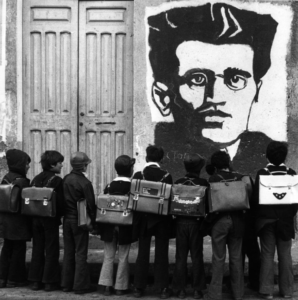It is evident that the seeds of modern concepts of ‘sarvodaya’ and ‘total revolution’ were sowed in Karnataka during twelfth century itself by the great revolutionary Basaveshwara. His practical approach and act of establishment of ‘Kalyana Rajya’ (Welfare state) brought a new status and position for all the members of the society, irrespective of class, caste, creed and sex. Thus the main aim of Vachana movement, led by Basaveshwara was welfare of all. He proclaims it as Sakala jeevatmarige lesu.
Basaveshwara revolted against all the social evils of the traditionalistic society and brought a drastic change in various facets of life during this time. We often talk about the human rights in the twenty-first century, but these human rights were being enjoyed by ‘Sharanas’ (citizens of welfare society) during 12th century itself, because of the socialistic and democratic approach of Basavanna.
Basaveshwara was born in Bagevadi (of undivided Bijapur district in Karnataka) in 1131 AD. His father Madarasa and mother Madalambike belonged to the Brahmin community. In accordance with religious tradition, he was initiated with the holy thread ‘janivara’ as a part of the Upanayana ritual, at the early age of eight years. Despite his very young age, Basavanna revolted against this tradition, threw away his janivara, left home and went to Kudalasangama, a city in the Bagalkot district of Karnataka, where he finished his education in a gurukul.
Basava married a cousin from his mother’s side, Gangambike, who was the daughter of the prime minister of Bijjala (1157–1167 AD), the Kalachuri king. Because of his high intellect, he was appointed as a karanika (accountant) in the court of king. When his maternal uncle died, the king who was very impressed with Basavanna’s financial management skills and administrative ability, appointed him as the prime minister.
Basaveshwara was deeply sensitive to the socio-economic ills of society. Society was dominated by regressive, superstitious and anti-social elements. There was much gap between the haves and have nots; and rich people were harassing the poor. Untouchability was rampant and sex discrimination made the lives of women very pathetic. Basavanna launched a struggle against all these evils. He himself started practising socialistic norms to influence others to also follow them, and thus change society. He scripted his practical experiences in a novel form of literature called ‘vachana’. Through this innovative literary form, Basavanna and his followers who are known as ‘Sharanas’ expressed their revolutionary views in a very simple Kannada language.
First of all Basavanna tried to change the concept of the temple, as it was the main centre of various types of harassments. Priests and rich people were exploiting the common folk in the name of God and temple. Basavanna tried to convince people that the real God and temple are within us. In one of his vachanas, he says:
Rich build temples for Shiva
What can I, a poor man, do?
My legs are pillars
My body is the temple
My head a cupola of gold
Oh, Lord of Kudala sangama
Things standing will perish
But the moving ever shall stay.
Basaveshwara thus gave two important and innovative concepts called Sthavara and Jangama, the meanings of which are ‘Static’ and ‘Dynamic’ respectively. Both these concepts are the main foundation stones of the revolutionary ideology of Basavanna. By ridiculing the physical structure of temple and God, which are perishable, Basavanna gave a new dimension to the human body and soul (inner spirit), by which the self respect of all human beings was boosted.
The ultimate goal of Basavanna was to establish a democratic society. Hence he fought against all types of inequalities which were existing in the rigid society of his time. He raised his voice against untouchability, which was being practised since ages. He not only mingled and mixed with untouchables but also ate food with them at their homes. This gave new courage to the downtrodden community to advance along with others. Likewise, Basavanna brought the women folk to the forefront of the society and gave them courage to sit along with men and to express their inner feelings and their pains. One of his most revolutionary innovations was the establishment of the ‘Anubhava Mantapa’, a platform open to all, including the downtrodden, untouchables and women, where they could come, freely express their views, and discuss about the prevailing socio-economic and political problems, as well as religious and spiritual principles and even personal problems. Thus Anubhava Mantapa is considered to be the first Parliament of not only India but of the world, where Sharanas sat together and discussed about the welfare of the people.
Basavanna introduced an adult education system which led many people from the lower castes to become writers – vachanakaras or writers of vachanas. This led to a boom in literary production; more important, it proved that knowledge did not brook discrimination. These vachanas could be considered the first writings produced by Dalits and other lower castes, as well as women.
Another two very important socio-economic principles given by Basavanna are Kayaka (divine work) and Dasoha (equal distribution). According to these, every individual in society should take up the job of his/her choice and perform it with all sincerity. Even the Guru and Jangama, who were treated as the superiors of the society, must also work. All members of the society are labourers (kayakajeevigalu). Some may be intellectual labourers and others may be manual labourers. But all are equal, there is no discrimination in vocations. Kayaka is not merely work, but it is the way of realising God through work by the body, which means Kayashrama. It thus teaches the concept of dignity of labour also. Basavanna was perhaps the first person in the world who wrote and preached about revolutionary idea that work is worship. This concept gave birth to a new movement and people from all walks of society started loving their work and involving themselves in society building tasks without any feeling of class, caste and sex discrimination.
Kayaka must be followed by an accurate income. This means, the income should not be more or less. There must be an equal income for equal work. The worker (kayakajeevi) must lead his day-to-day life by his heard earned income only. But he should not preserve the money or property for tomorrow. He must utilise the surplus money for the society and the poor. This concept is called Dasoha. Through this principle, Basaveshwara thus gave the concept of equal distribution of wealth in society.
Basavanna asked people to live an ethical life. He condemned deceit and theft, greed and violence, wickedness and bad conduct and gave the highest priority to unimpeachable character and upright conduct. Some of his vachanas read like the Ten Commandments or the Sermon on the Mount. For example, he writes:
Do not steal, do not kill, and do not utter lies
Do not lose your temper, do not detest others
Do not glorify yourself, do not blame others.
This alone is purity within,
This alone is purity without.
And this alone is the way to please our lord
Kudalasangama.
Basaveshwara fought against all the evils of the society which were coming in the way of progress. His aim was to give a movement to the stagnant and static society. Hence he involved the people of all walks of the society in his movement, including women and the lowest castes. His intention was to bring about a total transformation of society. This clearly indicates that he was a visionary of a total revolution.
There are many preachers, revolutionaries, reformists, socialists, political thinkers, economists, humanists and so on in this world. But Basaveshwara was a combination of all these. Hence he is regarded as one of the greatest reformers of the medieval period. Mahatma Gandhi says, “It has not been possible for me to practice the teachings of Basaveshwara, which he taught 800 years ago and which he also practised. I have adopted a few of them; I am still a seeker in this aspect and not an accomplished one. Eradication of untouchability and dignity of labour were among his core concepts. One does not find even a faint shade of casteism in him. Had he lived during our times, he would have been a saint worthy of worship. If you, his followers, practice his precepts you could uplift not just Bharat but the whole world.” Yes, Basaveshwara was and is a universal human being, with the vision of Vishvodaya.
The present moral duty of his followers is not to worship his stone statue but to practice his universal principles of Liberty, Equality and Fraternity in their true sense. Then only his dreams will come true.
(Dr. Basavaraj Sadar is Station Director (R) of AIR, Bengaluru and Ex-President, Akhila Bharata Sharana Sahitya Parishat, Bengaluru.)




